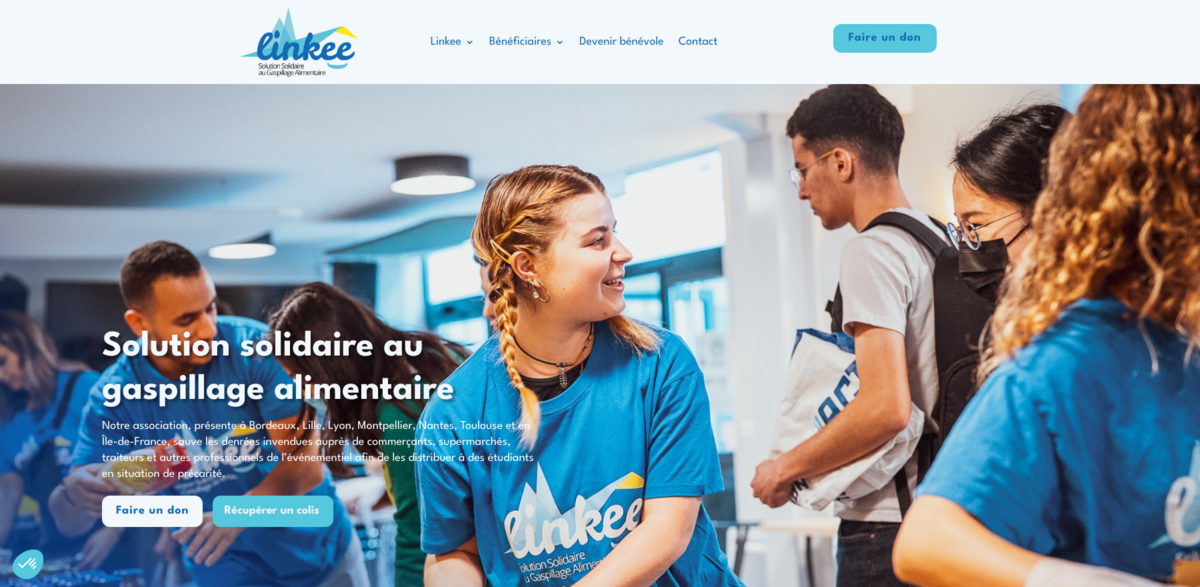What is Linkee?
Linkee is a solidarity solution to food waste. Based in cities like Bordeaux, Lille, Lyon, Montpellier, Nantes, Toulouse, and Île-de-France, the project saves unsold goods—from merchants, supermarkets, caterers, and other event professionals—and redistributes them as food aid to students in precarious situations. Originating in 2016, Linkee has perfected a logistical solution that recovers all types of unsold goods, especially fresh products with short expiration dates, which form the bulk of food waste in France. This innovative system connects food professionals who wish to part with their surpluses and food aid associations that always need more products. It’s all about practical solidarity… and making a difference.
Main Benefits of Linkee
Key figures and facts include:
- Presence in major cities: Bordeaux, Lille, Lyon, Montpellier, Nantes, Toulouse, and Île-de-France
- Launched in 2016 with a proven logistical solution
- Recovery of various unsold goods, with a focus on fresh products with short expiration dates
- Food aid is the largest in France, with 3 million meals distributed to precarious students in 2024
- Supported by around 9,000 volunteers actively involved in the process
The Logistical Ingenuity
Since its inception, Linkee deploys a robust logistical solution to recover surpluses and transform them into valuable food aid. The system is designed to handle different types and volumes of unsold goods with precision. This professional approach ensures that even perishable items, such as fruits, vegetables, meat, fish, and other products, are quickly and safely rerouted from waste to nourishment. The approach is both efficient and flexible—making the recovery process adaptable to various situations and local demands, especially when time is of the essence. It’s logistics working smartly to counter food waste and support communities.
Innovative Distribution Approach
The distribution method of Linkee is as innovative as its recovery process. Food aid is organized around robust parcels that typically weigh between 5 and 8 kilos. These parcels are composed of a mix of fruits, vegetables, meat, fish, and dry products, mostly from local producers, cooperatives, and organic stores. This locally sourced approach not only provides students access to quality products produced in an environmentally friendly manner but also reinforces local community bonds. On top of food items, the parcels include essential hygiene products—like feminine hygiene items—ensuring that assistance is both qualitative and comprehensive. The model is built on practicality, warmth, and a genuine desire to create a non-stigmatizing environment.
Volunteer Spirit and Community Engagement
The project relies heavily on a commitment that resonates with everyone involved—9,000 volunteers work tirelessly, driven by a shared sense of purpose. These volunteers, many of whom are beneficiaries themselves, ensure that the food aid is distributed at welcoming locations such as third places or associative cafés. The system fosters community engagement while breaking down the barriers that often accompany traditional charity. By registering based on a vulnerability dossier, the students receive tailored support, often accompanied by specialized associations and institutions ready to assist in various forms. The volunteer-driven model results in a community where help is not just given—it is a mutual exchange of support and care… energizing the entire process.
Partnering with Local Actors
Local engagement remains at the core of Linkee’s operation. The project’s strong local anchorage means that each distribution point is carefully chosen to align with community dynamics and local needs. Collaborative efforts with local producers, cooperatives, and organic stores not only guarantee a steady supply of quality food but also promote a more environmentally friendly agriculture. As the project collaborates with specialized associations and institutions, the approach to social and food aid is enriched. This multifaceted distribution ensures that beyond just meal provision, there is an embrace of local solidarity and a commitment to fostering healthier, more sustainable communities.
Impact on Sustainable Development Goals
- SDG 1: No Poverty – By supporting economically vulnerable students.
- SDG 2: Zero Hunger – Through the distribution of 3 million meals and robust food parcels.
- SDG 3: Good Health and Well-being – Via access to quality and nutritious food along with essential hygiene products.
- SDG 12: Responsible Consumption and Production – By recovering unsold goods and reducing food waste.
- SDG 17: Partnerships for the Goals – Through collaboration with local actors, food professionals, and volunteer communities.
Future Perspectives and Local Engagement
Looking ahead, Linkee’s commitment to bridging the gap between food waste and food scarcity continues to inspire local communities and social enterprises alike. The model’s extension during the lockdown showcased its capacity to adapt and meet a growing social emergency—student precariousness. With each distribution, the project nurtures the ties that bind communities together, encouraging more citizens to volunteer and support local networks. As it expands in scope, the promise of a more sustainable food chain, bolstered by professional logistics and community spirit, offers a hopeful vision of an inclusive society where waste is turned into opportunity and every meal counts.






















